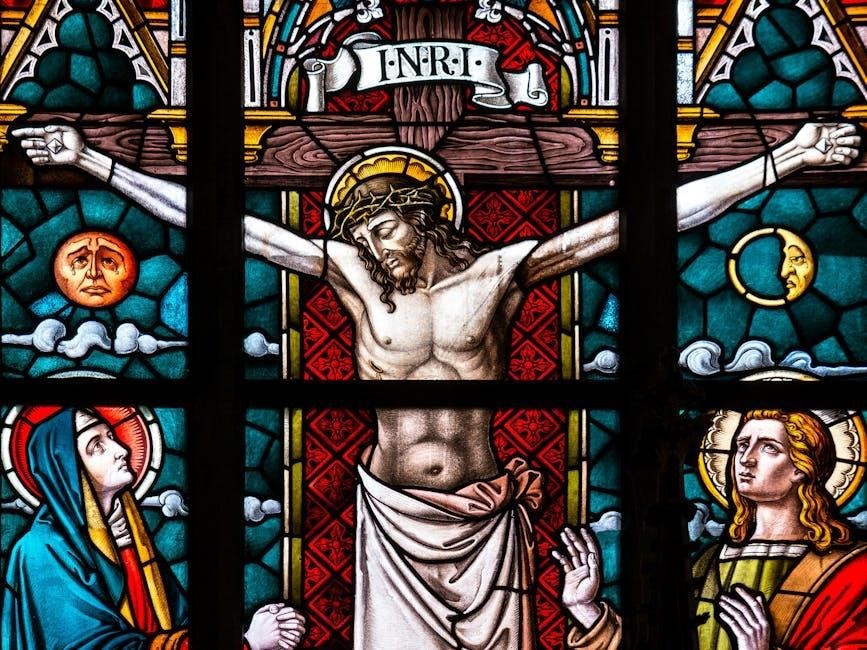Jesus Hopped the A Train, a gripping drama by Stephen Adly Guirgis, explores themes of justice, faith, and redemption through intense character dynamics and moral dilemmas, resonating deeply with audiences seeking a profound theatrical experience.
Overview of the Play
Jesus Hopped the A Train is a powerful drama by Stephen Adly Guirgis, set in a New York prison. It follows Angel Cruz, a bike messenger charged with shooting a cult leader, as he navigates a complex web of legal and moral struggles. The play delves into themes of justice, redemption, and faith, offering a raw, unflinching look at the human condition through its intense dialogue and rich character development, leaving a lasting emotional impact on its audience.
Historical Context and Relevance
Jesus Hopped the A Train, written in 2000, reflects the gritty realities of the American justice system and societal inequalities of its time. Set in New York’s Rikers Island, the play critiques systemic issues like mass incarceration and religious exploitation, resonating with contemporary debates on criminal justice reform and human rights, making it a timeless commentary on systemic oppression and individual struggle, remaining highly relevant today.

Background and Publication Details
Jesus Hopped the A Train, written by Stephen Adly Guirgis, was first published in 2002 by Methuen. The play spans 79 pages and is widely available in PDF format online.

Stephen Adly Guirgis is a renowned American playwright known for his gritty, realistic portrayals of urban life. His work often explores themes of redemption, morality, and societal struggles; Guirgis gained acclaim with Jesus Hopped the A Train, which premiered in 2000 and solidified his reputation as a bold, uncompromising voice in contemporary theatre. His writing style is raw, intense, and unflinching, resonating with audiences and critics alike. Guirgis’s contributions have significantly influenced modern drama, earning him widespread recognition and accolades, including the Pulitzer Prize for Drama in 2015.
Publication Date and Editions
Jesus Hopped the A Train was first published in 2002 by Methuen Drama, marking a significant milestone in contemporary theatre. The play has since been released in multiple editions, including digital formats such as PDF, which are widely available for academic and personal use. Its publication has enabled global access, fostering discussions on its themes and contributing to its enduring relevance in modern drama and educational contexts.
Availability in PDF Format
Jesus Hopped the A Train is readily available in PDF format, accessible through various online platforms and academic databases. This digital version allows readers to engage with the play’s powerful narrative and complex characters conveniently. The PDF format has also facilitated its use in educational settings, making it a popular choice for theatre studies and literature classes worldwide.
Plot Summary
Jesus Hopped the A Train follows Angel Cruz, a bike messenger incarcerated for shooting a cult leader, as he navigates a legal battle, grappling with justice, morality, and redemption.
Angel Cruz and His Struggles
Angel Cruz, a 30-year-old bike messenger from NYC, is imprisoned for shooting the leader of a religious cult that manipulated his best friend.Haunted by guilt and seeking redemption, he grapples with legal battles, moral ambiguity, and spiritual questioning. His struggles reflect the play’s exploration of justice, faith, and survival, making him a compelling and complex protagonist in a gritty urban landscape.
The Role of the Religious Cult
The religious cult in the play serves as a catalyst for Angel Cruz’s turmoil, manipulating his friend and triggering a violent response. Its influence underscores themes of exploitation and control, highlighting how vulnerable individuals can be swayed by charismatic leaders. The cult’s presence drives the plot’s tension and moral conflict, illustrating the destructive power of unchecked ideology and the blurred lines between faith and exploitation in a fractured society.
The Legal and Moral Dilemmas
The play delves into the legal and moral complexities of Angel Cruz’s actions, questioning the fairness of the justice system and the morality of violence. Cruz’s trial for shooting the cult leader sparks debates about self-defense versus vengeance, while the legal system’s flaws highlight systemic inequities. The moral dilemmas challenge characters and audiences to confront the ambiguity between right and wrong, raising questions about accountability, forgiveness, and the true meaning of justice in a flawed world.

Key Themes and Messages
Justice, redemption, and faith are central themes, intertwined with a critique of societal structures. The play explores moral ambiguity, challenging audiences to reflect on spirituality and systemic injustice.
Justice and Redemption
Justice and Redemption are central to the play, as Angel Cruz navigates a flawed legal system and grapples with moral accountability. His journey raises questions about guilt, forgiveness, and the possibility of redemption in a society marked by systemic inequality. The play challenges the notion of justice as purely punitive, instead emphasizing personal responsibility and the struggle for moral clarity in the face of adversity.
Faith and Spirituality
Faith and Spirituality are deeply intertwined in the play, as characters grapple with divine intervention and personal belief systems. Angel Cruz’s journey reflects a struggle to reconcile faith with the harsh realities of his circumstances. The play explores how spirituality can serve as both a source of comfort and a catalyst for conflict, particularly in the context of societal expectations and individual moral struggles.
Societal Issues and Critique
Societal Issues and Critique are central to the play, which examines systemic inequality, poverty, and racial disparities within the justice system. The narrative critiques the treatment of marginalized communities and the failings of institutional structures. Angel Cruz’s struggles highlight the cyclical nature of poverty and violence, while the play’s setting in Rikers Island underscores the harsh realities of incarceration. Guirgis’ work challenges audiences to confront uncomfortable truths about societal neglect and oppression.;
Characters and Their Development
The play delves into the complexities of its characters, with Angel Cruz as the troubled protagonist seeking redemption. Supporting characters like Lucius, Mary Jane, and Valdez add depth, exploring themes of morality, faith, and survival in a harsh world.
Angel Cruz: The Protagonist
Angel Cruz, a 30-year-old bike messenger from NYC, is the emotional core of the play. His struggle begins with the loss of his best friend to a religious cult, leading him to a desperate act of violence. Incarcerated and grappling with his faith, Angel’s journey is one of raw emotion, moral conflict, and the search for redemption in a system that challenges his humanity and spirituality.
Supporting Characters and Their Roles
The play features a cast of complex supporting characters who shape Angel’s journey. Lucius Jenkins, a seasoned inmate, offers wisdom and challenges Angel’s perspective. Mary, connected to the religious cult, embodies its manipulative influence. Valdez, a corrections officer, symbolizes the harsh realities of the justice system. These characters, through their interactions, highlight the moral ambiguities and societal critiques central to the narrative, enriching Angel’s struggle for redemption and self-discovery.
Critical Reception and Reviews
Jesus Hopped the A Train has garnered acclaim for its intense, thought-provoking narrative and moral complexity. Critics praise its raw energy and unflinching exploration of justice and faith.
Initial Response and Acclaim
The play received widespread critical acclaim upon its 2000 premiere, with praise for its bold storytelling and complex characters. Critics noted its unflinching portrayal of moral dilemmas and its ability to spark deep reflection. Audiences were drawn to its raw energy and thought-provoking themes, establishing it as a significant work in contemporary theatre. The play’s success led to numerous productions and revivals, solidifying its reputation as a powerful drama.
Modern Interpretations and Relevance
Jesus Hopped the A Train continues to resonate with modern audiences, offering timeless reflections on systemic injustice and moral complexity. Its exploration of faith, redemption, and societal inequality remains deeply relevant, sparking conversations about humanity’s struggles with morality and justice. The play’s intense dialogue and character-driven narrative make it a subject of academic study and a powerful tool for social commentary, ensuring its enduring impact on contemporary theatre and discourse.

Stage Productions and Adaptations
Jesus Hopped the A Train was originally produced in 2000 by LAByrinth Theater, with revivals in London and New York, praised for its intense storytelling and strong performances.
Original Production and Revivals
The original production of Jesus Hopped the A Train premiered in 2000 at LAByrinth Theater, directed by Philip Seymour Hoffman. It gained critical acclaim for its raw intensity and emotional depth. Revivals in London and New York followed, with the 2017 off-Broadway revival extending its run due to high demand. These productions showcased the play’s enduring relevance, drawing audiences with its gritty portrayal of justice and redemption.
Notable Directors and Cast Members
Philip Seymour Hoffman directed the original 2000 production, earning acclaim for its raw intensity; Notable directors include Stephen McKinley Henderson, who brought a gritty authenticity to revivals. Cast members such as Sean Earley and Elizabeth Canavan delivered powerful performances, capturing the play’s emotional depth. Their portrayals of complex characters like Angel Cruz and Lucius Jenkins highlighted the production’s dramatic intensity, ensuring its enduring impact on contemporary theater.

Cultural Impact and Legacy
Jesus Hopped the A Train has left a lasting mark on contemporary theatre, challenging societal norms and sparking conversations about justice and faith. Its raw, unflinching portrayal of human struggle resonates widely, making it a staple in academic curriculums and a benchmark for modern playwrights, ensuring its influence endures in both theatrical and cultural landscapes.
Influence on Contemporary Theatre
Jesus Hopped the A Train has profoundly influenced contemporary theatre with its raw, unflinching portrayal of humanity. Its exploration of justice, faith, and moral ambiguity has inspired playwrights to tackle gritty, socially relevant themes. The play’s intense dialogue and complex characters have set a benchmark for modern drama, encouraging a shift toward more authentic and emotionally charged storytelling. Its legacy continues to resonate, shaping the way theatre addresses societal issues today.
Academic and Educational Use
Jesus Hopped the A Train is widely studied in academic settings for its rich themes and complex characters. The play’s exploration of justice, faith, and redemption makes it a valuable resource for drama and literature courses. Its availability in PDF format has enhanced its accessibility for students and educators, fostering discussions on societal issues and moral dilemmas. The play’s emotional depth and raw dialogue also serve as a tool for teaching acting and playwriting, encouraging critical analysis and reflection on the human condition.
Jesus Hopped the A Train is a powerful exploration of justice, faith, and redemption, leaving a lasting impact through its emotional depth and intense dialogue, resonating deeply with contemporary audiences.
Final Thoughts on the Play’s Significance

Jesus Hopped the A Train remains a searing indictment of societal injustices and a profound exploration of faith, redemption, and human complexity. Its unflinching dialogue and moral ambiguity continue to resonate, challenging audiences to confront uncomfortable truths about justice and spirituality. Guirgis’s masterful storytelling ensures the play’s relevance, making it a timeless piece of contemporary theatre that provokes both emotional and intellectual reflection, leaving a lasting impact on all who experience it.
